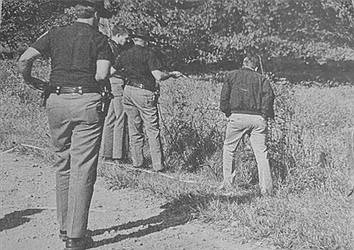Budget hearings set for next week
August 23, 2023 at 12:15 a.m.
Ahead of official budget hearings Aug. 29, Franklin County Council held a two-day workshop early last week. Perhaps the biggest takeaway was essentially a 3% raise for all local government employees and elected officials, though this is not expected to be finalized until Tuesday. Figures given by Reedy Financial Group put each percentage point at a $67,000 increase.
Each presenter Aug. 14 had the opportunity to present a case for more funding –often in the case of additional employees or salary for current and future workers - and most took advantage of the chance; some simply requested minor changes from this year’s budget.
Clerk Neysa Raible went to bat for her employees, saying they’re “very dedicated.” But she has trouble with retention and possibly grooming someone to be a future clerk.
“My big thing, we need to pay them better than McDonald’s,”she said. “We need to treat them as educated individuals because they have to learn lots of things. We deal with hundreds of thousands of dollars and are responsible for the (2024 federal election). The judge couldn’t do what the judge does if we didn’t do what we do.”
She stated she could use a new printer and help with preservation of records while also mentioning a future switch to county vote centers would be a total cost savings.
Assessor Debbie Schoettelkotte agreed with the difficulty in maintaining quality staffing, saying “3% is wonderful but I think our people are way underpaid as far as salaries go.”
Treasurer Jolene Beneker touched on a similar point while setting off an isolated discussion on the merits of upping employees from 32.5 hours per week to a full 40.
“My office (3 full-time employees) can’t work 32.5 during our busy times and stay open to the public,”she told the board.
She said comp time isn’t a solution for her office because she needs to be fully staffed. She gave an example of her chief deputy working more than 32.5 hours, saying he’s paid at the regular rate up to 40 and time-and-a-half after 40. She wanted $8,000 added to her overtime line to supplement the extra time.
Member Brian Patterson asked if certain offices could save money by going to 40 hours; the answer was yes, as it was for that move potentially helping with retention and hiring. He said it was about customer service and keeping doors open longer. “We’re going to give you more hours to work to make more money,”he said.
Colleague Glen Bischoff preferred seeing a breakdown of how this would impact the overall budget. He questioned forcing employees to work more when there isn’t always enough work to justify it.
President Jeff Koch said council investigated this four years ago, but it wasn’t embraced. “We’re going to have more people in full-time positions rather than part-time help floating in and out,”said Patterson. The board agreed to look at financial projections before deciding.
Recorder Hollie Maxie requested an additional $5,000 for part-time help with permanent retention of records. Coroner Brian Baxter asked for $225 per deputy call, up from its current rate of $200. Surveyor Rob Seig said his budget would go up 4% if approved; he was told monies could be moved around to help with professional improvement/conferences.
Emergency management director Amy Lindsey had a couple of primary goals for her office. One was funding her contract deputy position targeted recently for Bethany Luers. The other was consideration of receiving a federal $300,000 grant, which would help determine her spending priorities; however, she won’t know until October whether the grant is awarded.
She had $10,000 allotted this year for the deputy slot, then wished to transfer $2,000 from volunteer pay and $6,000 from radio maintenance charges to make it more lucrative. She also wants $65,000 worth of 800-Mhz radios, which could be paid by the grant along with a Cradlepoint Wi-Fi device estimated at $4,900. A higher quality truck to transport hazardous materials is also on the wish list.
Parks superintendent Ted Hensley raised some questions when he asked for a third full-time employee at the county park to supplement the current two –one working second and the other working third shift from April to October. He said the new employee would help with computers and reservations.
Patterson balked at this, saying it could only be justified if the park stays open year-round for campers and hunters. He also couldn’t understand why the park board had still not instituted online reservations, “getting the park into the future.” He raised a safety concern when on Jan. 1 of each year, cars are backed up across the bridge trying to reserve spots for the September antique tractor show. “It just is not efficient …if they don’t want to come into the 21st century with computers, what’s the point in spending more money?”
Dr. David Welsh, public health officer, spoke for the health department. The budget submitted did not consider an additional $225,000 coming to the department next year as part of the governor’s public health commission legislation. So new initiatives like partnerships, children’s safety and better access to behavioral health services and AEDs (defibrillators) were only outlined. The council and commissioners will help the department with its program goals.
Veronica Bullock, Purdue extension educator, had a big ask in adding a third educator to the office. She said the person would lead health and human sciences and coordinate community development. Bullock cited statistics that Franklin County had fallen 30 spots in quality of life ranking among all 92 counties. The pay and benefits would add up to around $75,000, partially paid by the university based on the county’s population.
In the non-profit arena, Missy Ratz said she continues to have trouble finding drivers for public transportation, citing a $9.50/hr. allotment. In addition to a salary boost, she asked for a local match ($22,941) for a new transit van that could carry eight passengers and two wheelchairs. She told the board of significant leaks in the roof over the transportation portion of the senior center.
Mary Mattingly with Safe Passage said there’s an increase in clients needing refuge from domestic abuse, coinciding with a reduction in state and federal funding. Thus, they are asking all counties they serve for a 10% increase in funding. Melinda Brown, Stayin’Alive, requested a $10,000 contribution to help support drug-free coalition efforts beyond the organization’s funds that go back out to community programs.
After a second vote, the council agreed to grant Sheriff Peter Cates another full-time deputy. Auditor Karla Bauman said under Indiana law she can make recommendations to the council; she said base pay generally lags other counties of similar size and recommended dispatchers and jailers get an additional $1,000 above the 3% increase. Bauman also requested another deputy for herself if the work hours remain at 32.5.
Also, a contract with EMS was approved for one year at $500,000. Prosecutor Chris Huerkamp asked for a $5,000 increase for each assistant attorney.
Latest News
E-Editions
Events
Ahead of official budget hearings Aug. 29, Franklin County Council held a two-day workshop early last week. Perhaps the biggest takeaway was essentially a 3% raise for all local government employees and elected officials, though this is not expected to be finalized until Tuesday. Figures given by Reedy Financial Group put each percentage point at a $67,000 increase.
Each presenter Aug. 14 had the opportunity to present a case for more funding –often in the case of additional employees or salary for current and future workers - and most took advantage of the chance; some simply requested minor changes from this year’s budget.
Clerk Neysa Raible went to bat for her employees, saying they’re “very dedicated.” But she has trouble with retention and possibly grooming someone to be a future clerk.
“My big thing, we need to pay them better than McDonald’s,”she said. “We need to treat them as educated individuals because they have to learn lots of things. We deal with hundreds of thousands of dollars and are responsible for the (2024 federal election). The judge couldn’t do what the judge does if we didn’t do what we do.”
She stated she could use a new printer and help with preservation of records while also mentioning a future switch to county vote centers would be a total cost savings.
Assessor Debbie Schoettelkotte agreed with the difficulty in maintaining quality staffing, saying “3% is wonderful but I think our people are way underpaid as far as salaries go.”
Treasurer Jolene Beneker touched on a similar point while setting off an isolated discussion on the merits of upping employees from 32.5 hours per week to a full 40.
“My office (3 full-time employees) can’t work 32.5 during our busy times and stay open to the public,”she told the board.
She said comp time isn’t a solution for her office because she needs to be fully staffed. She gave an example of her chief deputy working more than 32.5 hours, saying he’s paid at the regular rate up to 40 and time-and-a-half after 40. She wanted $8,000 added to her overtime line to supplement the extra time.
Member Brian Patterson asked if certain offices could save money by going to 40 hours; the answer was yes, as it was for that move potentially helping with retention and hiring. He said it was about customer service and keeping doors open longer. “We’re going to give you more hours to work to make more money,”he said.
Colleague Glen Bischoff preferred seeing a breakdown of how this would impact the overall budget. He questioned forcing employees to work more when there isn’t always enough work to justify it.
President Jeff Koch said council investigated this four years ago, but it wasn’t embraced. “We’re going to have more people in full-time positions rather than part-time help floating in and out,”said Patterson. The board agreed to look at financial projections before deciding.
Recorder Hollie Maxie requested an additional $5,000 for part-time help with permanent retention of records. Coroner Brian Baxter asked for $225 per deputy call, up from its current rate of $200. Surveyor Rob Seig said his budget would go up 4% if approved; he was told monies could be moved around to help with professional improvement/conferences.
Emergency management director Amy Lindsey had a couple of primary goals for her office. One was funding her contract deputy position targeted recently for Bethany Luers. The other was consideration of receiving a federal $300,000 grant, which would help determine her spending priorities; however, she won’t know until October whether the grant is awarded.
She had $10,000 allotted this year for the deputy slot, then wished to transfer $2,000 from volunteer pay and $6,000 from radio maintenance charges to make it more lucrative. She also wants $65,000 worth of 800-Mhz radios, which could be paid by the grant along with a Cradlepoint Wi-Fi device estimated at $4,900. A higher quality truck to transport hazardous materials is also on the wish list.
Parks superintendent Ted Hensley raised some questions when he asked for a third full-time employee at the county park to supplement the current two –one working second and the other working third shift from April to October. He said the new employee would help with computers and reservations.
Patterson balked at this, saying it could only be justified if the park stays open year-round for campers and hunters. He also couldn’t understand why the park board had still not instituted online reservations, “getting the park into the future.” He raised a safety concern when on Jan. 1 of each year, cars are backed up across the bridge trying to reserve spots for the September antique tractor show. “It just is not efficient …if they don’t want to come into the 21st century with computers, what’s the point in spending more money?”
Dr. David Welsh, public health officer, spoke for the health department. The budget submitted did not consider an additional $225,000 coming to the department next year as part of the governor’s public health commission legislation. So new initiatives like partnerships, children’s safety and better access to behavioral health services and AEDs (defibrillators) were only outlined. The council and commissioners will help the department with its program goals.
Veronica Bullock, Purdue extension educator, had a big ask in adding a third educator to the office. She said the person would lead health and human sciences and coordinate community development. Bullock cited statistics that Franklin County had fallen 30 spots in quality of life ranking among all 92 counties. The pay and benefits would add up to around $75,000, partially paid by the university based on the county’s population.
In the non-profit arena, Missy Ratz said she continues to have trouble finding drivers for public transportation, citing a $9.50/hr. allotment. In addition to a salary boost, she asked for a local match ($22,941) for a new transit van that could carry eight passengers and two wheelchairs. She told the board of significant leaks in the roof over the transportation portion of the senior center.
Mary Mattingly with Safe Passage said there’s an increase in clients needing refuge from domestic abuse, coinciding with a reduction in state and federal funding. Thus, they are asking all counties they serve for a 10% increase in funding. Melinda Brown, Stayin’Alive, requested a $10,000 contribution to help support drug-free coalition efforts beyond the organization’s funds that go back out to community programs.
After a second vote, the council agreed to grant Sheriff Peter Cates another full-time deputy. Auditor Karla Bauman said under Indiana law she can make recommendations to the council; she said base pay generally lags other counties of similar size and recommended dispatchers and jailers get an additional $1,000 above the 3% increase. Bauman also requested another deputy for herself if the work hours remain at 32.5.
Also, a contract with EMS was approved for one year at $500,000. Prosecutor Chris Huerkamp asked for a $5,000 increase for each assistant attorney.





